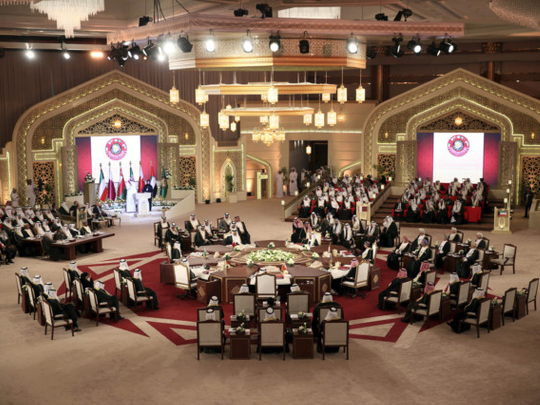
The 34-year-old Gulf Cooperation Council (GCC) was heading for disaster in 2014. Political tensions were at an all-time high between four Arab Gulf capitals as three ambassadors were suddenly recalled in March 2014 from Doha, Qatar — a founding member was feeling more isolated than ever before with threats of further punishment if it did not reconsider its position; the political rift was going from bad to worse. It nearly lasted for nine months and to the very last minute, no one was in the mood to compromise or give in. Kuwaiti and Saudi shuttled diplomacy was going nowhere and Doha was in doubt. Gulf politics was in shambles and many were giving up on the slow-moving and deeply-frustrating Gulf integration project. If six deeply similar states cannot achieve the minimum of military coordination, security cooperation and economic integration then regional integration is not worth all the genuine efforts and occasional media hypes.
Luckily, disaster was avoided towards the end of this year. Last-minute decisive Saudi intervention successfully halted the imminent slide to free-fall. Riyadh used its moral and political leadership to force everyone to back away from the brinkmanship politics. Qatar was willing to compromise and in turn got to host the 35th Gulf summit. All the others recognised the danger of having the once-vibrant Gulf integration disintegrate. Gulf cooperation was back on track and the political dispute was officially over when the three ambassadors were swiftly sent back to Doha. A high-level UAE delegation led by General Shaikh Mohammad Bin Zayed Al Nahyan, Abu Dhabi Crown Prince and Deputy Supreme Commander of the UAE Armed Forces, landed unexpectedly in Doha for a short visit. The visit signalled the end to the nine-month-old Gulf dispute. The rift was finally behind us and the GCC states were ready for a ‘reset’ policy and look forward to a new beginning.
The little fire at the far end of the usually stable Gulf Maison has been extinguished and the six GCC states are once again talking to each other and are looking towards a more promising 2015. The GCC political dispute of 2014 was serious but was only limited to the political leg of the Gulf integration project. All the other legs — economic, military, security and social aspects of Gulf integration were in full operation during the nine months of the Gulf rift.
The multi-faceted GCC has proved to be resilient. It has developed its own logic and dynamics. It is a much more elaborate integration venture than what many recognise. It has long ago passed the test of ‘to be or not to be’. The GCC is firmly grounded and is here to stay and will steadily move forward in the best manner of the spillover theory of regional integration. It is practically impossible for the GCC states to go back to the pre-GCC era. The web of legal, institutional and personal relationship is too thick to allow for a breakup of Gulf integration. Geographical proximity, cultural identity, objective necessity and the common interests that have developed over the past three decades are vast enough to sustain the GCC indefinitely. Gulf integration can only go incrementally forward not backward.
But the GCC, like all integrated regional blocs, goes through moments of breakthroughs and breakdowns. 2014 was certainly a year of a breakdown for the GCC, which went half a step backward. But these cyclical ups and downs are typical of regional integration throughout history. Even the most mature and formidable-looking European Union (EU) has had its moment of disaster. The Eurozone is in crisis, Britain wants time out, France and Germany are no longer on the same Union page, Greece and Italy want to abandon the lunacy of the euro, people throughout the European continent are in open revolt and European political elites are at each other’s throats in Brussels. The seven-decade-old EU is in shambles.
The GCC is heading for 2015 in a much better shape than the depressed EU. The GCC had a successful summit in Doha last week. It has now an Interpol (a joint police force) headquartered in Abu Dhabi. It has also considered the establishment of a naval force based in Bahrain. But more significantly, the GCC has taken the first step to form its own version of Nato (a joint military command to be located in Riyadh). Everybody seems to have walked away as a winner. The Doha summit has even decided to revive the Gulf Union project and give it a second try. Whoever foolishly said the GCC is finished ...
If 2014 was a bad year, which it was, 2015 is looking promising for the new-born GCC, which is more self-confident and has become more regionally assertive than ever. The simple lesson is clear: Never ever give up on the GCC.
Dr Abdulkhaleq Abdulla is a professor of political science. You can follow him on Twitter at www.twitter.com/Abdulkhaleq_UAE












